See also Seattle Smart Gun Symposium part 1, Seattle Smart Gun Symposium part 2, Seattle Smart Gun Symposium part 3, and Smart Gun Symposium in the news.
Margot Hirsch
President, Smart Tech Challenges Foundation
Hirsch didn’t really say a lot but what she did say demonstrated she was generally knowledgeable about the technology. The only thing I thought she was off base on was she thought smart guns would protect against thieves. The other thing of note which she said was that the market for this technology were families.
The following information is from the bio given to participants:
Margot Hirsch is the President of the Smart Tech Challenges Foundation (STCF) a non-profit focused on reducing gun violence through the technology and innovation. The STCF was formed in 2013 with the mission of bypassing the political gridlock and polarizing debate around gun control versus person freedoms, by spurring innovation in technologies that serve to reduce firearm-related injuries and death. By awarding grants directly to innovators through the first-of-its-kind Smart Tech for Firearms Challenge, Margot is on the leading edge of inventive challenge philanthropy, finding market-based, entrepreneurial solutions to a social problem that claims over 30,000 American lives annually. She is responsible for the overall strategic direction of the foundation, running operations, board development and fundraising.
Prior to joining STCF, Margot was Regional Vice President of Blackboard, Inc. where she led international sales for the Connect division of Blackboard, a leading provider of learning solutions to the education market. With over 25 years of sales and business development in the technology industry, Margo has held business development and sales management roles at Smartforce/Skilsoft, eProsper, Angel Investors, Global Village and American Express.
More information about the organization and some of the people and technology they have given grants to can be found on their web site.
Mark Burles
Vice President, Penn Schoen Berland
Burles presented polling data from a recent survey they had done for Washington CeaseFire. One should be careful using their data. From their website:
What We Do
How We
Do It

1
DEFINE YOUR
COMPETITIVE
ADVANTAGEWe measure a brand’s strength in context with its competitors to identify its assets, liabilities, & unique niche in the marketplace relative to the competition.

2
FIND YOUR
“BASE” & “SWING”
AUDIENCESOur model not only identifies a brand’s loyal customer base, but also uncovers persuadable consumer segments who can be taken from competitors to grow the brand.

3
CRAFT A
WINNING
MESSAGEPSB’s proprietary message development process delivers a clear roadmap of what to say, how to say it, and to whom to say it.

4
DELIVER A
PERSUASIVE
CAMPAIGN
In this instance their customer is Washington CeaseFire.
That said this is the data Burles presented to the audience:
Online poll of 800 respondents, representative of the US General Population. Margin of error is +/- 3.46 overall and larger for subgroups.
Questions:
- Is there currently a gun in your house (either owned by you or by someone else who lives with you)?
Definition: Smart guns are guns that can only be operated/fired by the owner or per designated individual due to technology or other constraints.- Would you consider swapping the guns currently in your home for new, safer “smart guns” when they come on the market?
- How strongly do you agree or disagree that guns dealers should be allowed to sell “smart guns”?
- How strongly do you agree or disagree with the following statement? Once the technology is commercially available, there should be a law saying that all firearms sold must be so-called “smart guns.”
How do they do an online poll without a self-selection bias?
31% of the people polled answered “Yes” to the question, “Is there currently a gun in your house (either owned by you or by someone else who lives with you)?”
40% of the gun owners said they would swap their current gun for a smart gun. But these numbers decreased with the age of the gun owner. If the gun owner was 55+ years old only 23% would swap their current gun for a smart gun.
66% of the public agreed that gun dealers should be allowed to sell smart guns.
Of those that agree 87% are gun owners, 75% are women, and 59% are women.
I don’t get this. Of those that agree, how can there be 75% men and 59% women? Surely they meant 75% the men agree and 59% the women agree. Right?
Over all 51% think there should be a mandate for “smart guns” if the technology is commercially available. But only 38% of gun owners agree while 62% of the general public agrees with a mandate.


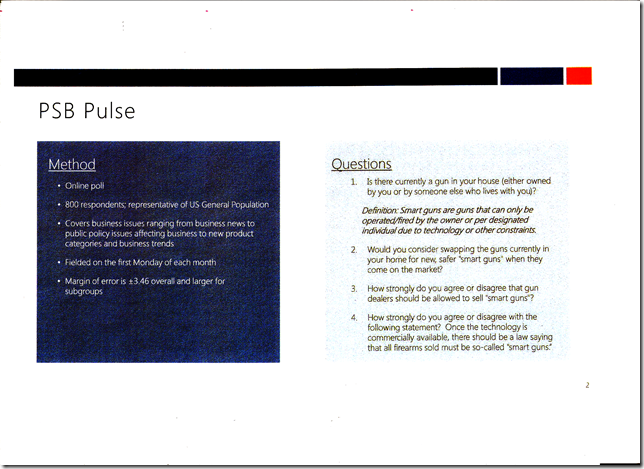
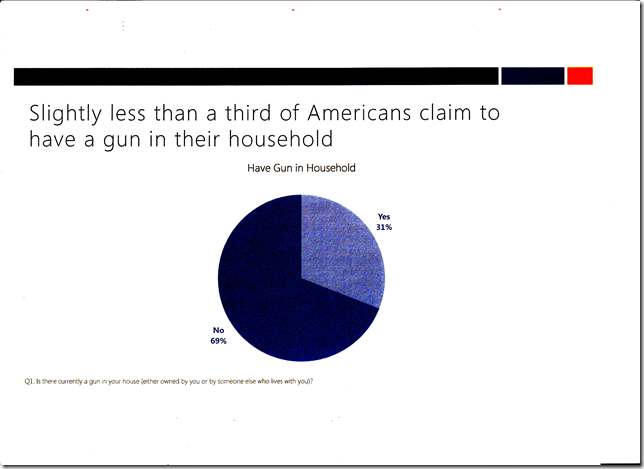
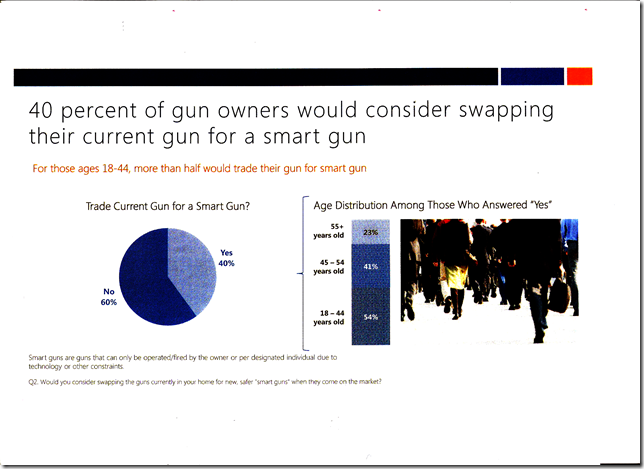
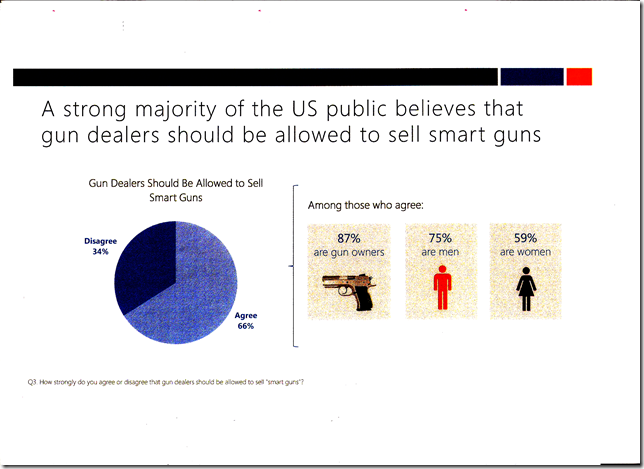
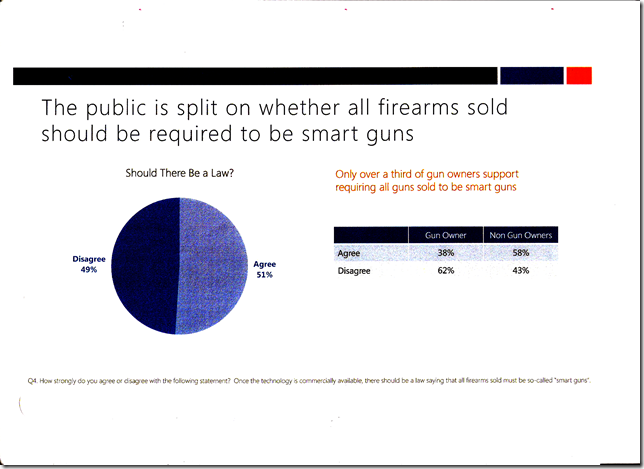

Pure hogwash. Every step is an attempt at deception and obfuscation.
“…entrepreneurial solutions to a social problem that claims over 30,000 American lives annually.”.
By entrepreneurial they mean technological, and there is no such thing as a technological solution to a social problem. Only an authoritarian would think so. Which social problem claims over 30,000 American lives annually? If there is one, it has nothing to do with guns. There aren’t nearly that many total murders, and there are far fewer fatal gun accidents than murders.
If there were a technological solution to social problems, Africa would be a productive, wealthy paradise right now. Actually it would have been a peaceful, productive and wealthy paradise fifty years ago. Or a hundred. Detroit has more technology than it had fifty years ago, and yet it has gone from pretty good to horrible. North Korea has lots of technology. So does Iran. Why aren’t we all wishing we could live there?
Why ask people if gun dealers should be “allowed” to sell “smart guns”? Who’s stopping them? This is an old, old Progressive device, designed to manipulate stupid people;
“Should people be ‘allowed’ x, y, or z?”
“Oh, yes of course people should be allowed…”
That’s to help get the ball rolling, and the money flowing, in preparation for the goal;
“See, mister investor or mister Congressman; four out of five dentists surveyed believe that x, y, and z should be allowed.”
Then comes the hook;
“If this works out, then would you support requiring; x, y, or z”?
Once it’s required of course the problem of crime will persist, and so obviously “We” will need additional “safeguards”, such as remote disabling and reporting of discharges and location information and so on. You don’t HATE children, do you?
Once they get the technology required, it’s a matter of a vary short time before they’ll be able to turn off your gun, or simply make it so unreliable for self protection that you’ll prefer a sharp stick. Just like Obama Care, it’ll have been designed from the outset to make everything worse, to make you decide all on your own that the whole system should be replaced with a “new system” (single payer, i.e. communism). In the case of guns you’ll simply opt out. Your carry permit or hunting license will only be good for a smart gun, which will suck so bad (by design) and be so intrusive and so expensive that you won’t want it.
The beauty of this farce is that it contains plausible deniability at every stage. By the time its goals have been fully realized, no single person who helped make it happen along the way will have any prosecutable culpability;
“It was all just for safety, right? All just to save lives. That’s what we were told the whole time, and who could argue against saving lives? We never knew it could come to this! How could we? We thought we were doing something good, damn it! It’s not our fault?”
Yes. It’s one of those deliciously evil plans that is just too good to pass by. And how interesting, and now fascinating! We engineers, electrical engineers, technicians and software developers will have a great time being involved solving the technical challenges while rubbing shoulder with other “smart” people in the pertinent industries. How wonderful! And if it’s all for saving lives, who can turn it down?
“We” will need additional “safeguards”, such as remote disabling”
My sentiments exactly, I always wondered why people could not even think of this problem.
Child Protective Services comes into your home. They did this automatically in Idaho when my wife and I have our first child.
“I see you have a hunting license and a concieled carry permit. You no doubt have Smart Guns for these purposes, no? I’ll need to see them. Also I see that you purchased an NFA weapon two years ago. I’ll need to take that, as it is not a Smart Gun and thus puts our (yes, that’s “our” not “your”) child at risk.. Thank you!”
No, Young Grasshopper; Progressivism is a social problem that kills. And it kills a hell of a lot more humans beings than anything else, save old age. Of we put “smart chips” on every Progressive, with remote disabling capability, we could have saved two hundred million lives in the 20th century, and could probably save several billion in the 21st.
This is a path that would probably just lead to additional convolution and complication when operating a firearm– something that doesn’t come out as a benefit no matter how you spin it.
It definitely is a benefit — if your goal is to disarm citizens.
“40% of the gun owners said they would swap their current gun for a smart gun.”
No, no they did not. That wasn’t the question. 40% said they would consider swapping their current guns for a smart gun. I’m guessing that a much smaller percentage will decide to swap, after considering reliability concerns, safety concerns, use cases, models and calibers currently available (one .22 so far, right?), and overall cost (triple [or more] the market value of a comparable “dumb gun”) – including maintenance (firmware updates, repairs on the electronics, battery replacements, tech support calls, etc.).
So, yes, I will consider it. Be forewarned, even if (big “if”) the current technological issues are fixed and resolved, more calibers/models become available, and the price comes down, there’s a 99% probability I’ll decide not to swap. But I’ll consider it.
I would not, not under any circumstance whatsoever. Never mind the obvious lack of technical merit — the lack of honesty and integrity on the part of its perpetrators disqualifies it immediately.
One could argue that by reading the testimonies and justifying your decision, you’ve already considered it.
And no, that’s not a dig or an attempt at a “gotcha”. I approach it the same way: inclined to say “no” at first, and the more I learn about it the more inclined to say “no” I become.
Pingback: The future of dynamic grip recognition for “smart guns” | The View From North Central Idaho
Pingback: Episode 26 | Gun Blog Variety Cast